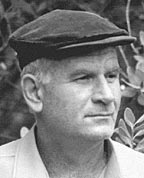| ELISHA PORAT |
 Elisha Porat He was born in 1938 to a pioneer family in Petah Tikva, Israel. In the early 1930s his parents were among the founders of Kibbutz Ein Hahoresh, where he was raised and still makes his home. Drafted into Israeli Army in 1956, heserved in a frontline reconnaissance unit and fought the Six Day war in 1967, and the Yom Kippur War in 1973. As a lifelong member of his kibbutz, he has worked as a farmer as well as a writer. He currently performs editorial duties for several literary journals. You can contact him at porat_el@einhahoresh.org.il. |
Posted 02.00 Kibbutz Ein Hahoresh, Israel War Baby
Our daughter was born several months before the Yom Kippur War. When the bus arrived to pick up the reservists, my wife carried her in her arms. Too small and tender to grasp the drama around her, she came along with the rest of my family following me to the bus to say goodbye. I planted a strange goodbye kiss on her.
So little time had passed since her birth that I hardly knew her. She gave me an infant's innocent smile as though she knew we were separating. The large women crowded behind her were pale and grave. Some, unable to restrain themselves, wept as the bus slowly filled. This was the Saturday night of Yom Kippur.
Several long weeks passed after that. I didn't see the baby or any of my family at all. With difficulty, we exchanged a few words over bad telephone lines. My first pass after the first cease-fire was very short and I terribly rushed. I had no time for the baby. I had to calm my wife and catch up with my older children, ease their fears and answer their anxious questions.
We all needed to feel that everything now really would be all right again, just as it had been before. My wife and I called our daughter "the war baby." But that was only between her and me, when others couldn't hear us, in the last painful moments before my departure.
I left several matters unfinished when I suddenly returned to the front. Throughout the long trip from our home to the battle-field, I was bothered by the thought that I hadn't treated our baby right. Too few hugs and kisses. I felt a great need to use language to relieve the tension building in me, but she couldn't speak even one little word.
My service after the fighting extended for months without end. It was hard to keep things together, and my brief leaves didn't always help. Our daughter grew bigger meanwhile, but I was still far away. The "war baby" made her own demands. A thin yet not so breakable barrier imperceptibly arose.
Around me I saw men whose lives weren't as fortunate as mine. Some never made it home. Others weren't the same on their return. Many had trouble bridging the abyss that suddenly gaped before them. For the first time, a sense of betrayal beset many of the younger soldiers. The anger and frustration struck roots. The first waves of the protest movement erupted.
Sometimes, I also would find myself angry at our "war baby" without realizing it, as though the whole mess had occurred because of her. As though it were her fault that I was so far away and suffering so much in this hard, endless service.
And I was angry at myself. Why should our daughter have to go through all this? Hadn't we promised her a better, safer life? Was she to blame for becoming our "war baby?"
Later, I received my much-desired discharge and made a bitter-sweet return home. Since then, I've been trying to rid her and me of the unhappy nickname "war baby." She's grown into a beautiful little girl since the dark days of the war. She's a kid like all the others. They don't try to talk to us about the war. It seems to be bad manners to bring up the subject.
Only occasionally, when a shadow crosses over our heads, do I remind my wife of the odd name we gave our daughter when she carried her in her arms to the troop bus. And cursed be the day, I tell myself and my wife, when tender newborns again will be called "war babies." (Translated from the Hebrew by Alan Sacks) |